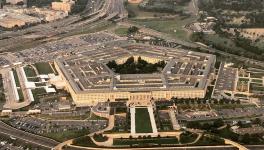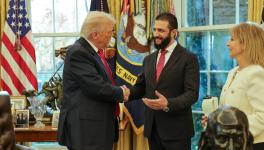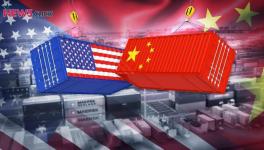US Realises Importance of Bringing China-US Economic Trade Ties Back on Track
The G7 leaders celebrated that the tumultuous Donald Trump presidency is over. French President Emmanuel Macron (L) sharing happy moment with President Biden, Cornwall, UK, June 12, 2021
The European countries have their own plans, while welcoming the US leadership and resuscitating trans-atlanticism but not jeopardising their cooperation with China. They will tread softly regarding Washington’s calls to crack down on China. Cooperation in the business circles will not be dented because enterprises will vote with their feet.
The CNN reported that the seven leaders aired serious differences over how best to approach China during a session of the G7 summit, with Germany and Italy in particular, as well as European Union leaders, opposed to dealing with China in a confrontational manner.
As the New York Times highlighted, there is an “anxiety” in Europe generally about American politics. Ian Lesser, a vice president at the German Marshall Fund of the United States was quoted as saying, “Simply, what is going to happen in the midterm elections? Whether Trumpism will prove more durable than Mr. Trump. What is coming next in American politics?”
Equally, Europeans are well aware that the trade war hurt the US badly. According to a study by Oxford Economics in January this year, the cost of the trade war for the US was around 0.5% of GDP in 2018-2019, an estimated 245,000 jobs and $88 billion in real household income. If the scenario escalates, the US GDP will shrink by $1.6 trillion over the next five years and result in 732,000 fewer jobs in the US in 2022.
Indeed, the Biden administration, too, realises that merely seeking conflicts with China or being blindly hardline, is unwise, as the US still needs to coordinate with China regarding issues like trade and regional order. That was the signal in the State Secretary Antony Blinken’s call with China’s top official on foreign affairs Yang Jiechi on June 11, on the eve of the G7 summit in Cornwall.
The State Department readout projected Blinken’s call as a fine example of the selective cooperation with China that the Biden administration desires. But the Chinese readout underscored that Beijing hangs tough on its core concerns.
Also read: Top US, Chinese Diplomats Clash Publicly at First In-Person Talks Under Biden Presidency
The US is aware that if it crosses China’s red line on the Taiwan question, there is going to be a heavy a price to pay at the cost of US own interests. Basically, it is hoping to hold Beijing in play without risking the US long-term interests. That is to say, for all practical purposes, the Biden administration is respecting China’s red line and wants to maintain flexibility in its handling of overall relationship with Beijing.
This is very important, as both sides know that the Taiwan question is the most vital indicator for Beijing to observe the momentum of the China-US relations.
Again, last Thursday, in the run-up to the G7 summit, China’s Commerce Minister Wang Wentao and US Commerce Secretary Gina Raimondo had a “candid and pragmatic” exchange of views on relevant issues of mutual concerns in the business sector. Interestingly, this was the third discussion over a two-week period initiated by top US economic and trade officials with their Chinese counterparts in the run-up to the G7 summit.
The Chinese Vice Premier Liu He held a virtual meeting with US Treasury Secretary Janet Yellen on June 2 and Liu also held a phone call with US Trade Representative Katherine Tai on May 27. Indeed, John Kerry, Biden’s climate envoy, had met with Xie Zhenhua, China’s special envoy, during his visit to Shanghai (April 14 – 17.)
The Chinese statement on Thursday on the conversation between the two commerce ministers said it was a “candid and pragmatic” exchange on relevant issues of mutual concerns in the business sector and both sides agreed to promote pragmatic cooperation in trade and investment, while maintaining working communication.
Earlier, a Chinese spokesperson told a press conference that Beijing and Washington have resumed “normal communication” in the economic and trade fields, and will work together to solve “specific problems” in a practical manner for producers and consumers. All this only underlines that the US has realised the importance and necessity of bringing the China-US economic trade ties back on track.
Meanwhile, even as the US ramped up cold war idiom against China at the G7, China unrolled a potent countermeasure of its own. Last Thursday, China’s top legislature passed the Anti-Foreign Sanction Law, the first one of its kind, providing strong legal support and guarantees for China against unilateral and discriminatory measures imposed by other countries.
The new law empowers China’s State Council to create its own sanctions on any organisation or individual that participates in the formulation, decision-making or implementations of sanctions against China. Effectively, this gives Beijing the legal framework to target entities that wilfully damage China’s reputation through smear campaigns.
Also read: China Asks US to Stop 'Smearing' CPC, Lift Sanctions on Trade
Clearly, this move testifies to an increasingly confident China on the international stage. If China previously lacked the economic power or political will to retaliate against US sanctions, it now has that capability. Historically, China only retaliated against sanctions through countermeasures on case-by-case basis. But China is now entering the sanctions game, making it clear that the US and its allies no longer will have a monopoly over sanctions as an instrument to impose on China their specific political values.
In the words of a Chinese commentator, “In moving from an ad-hoc response to a fully-fledged legal framework, China has also demonstrated its willingness to promote the rule of law in its dealings in the international arena. This follows President Xi Jinping’s instructions to use the rule of law to defend China’s sovereignty. It is also an essential counter to what has variously been described as “long-arm jurisdiction”... Whether the US and its allies prefer to accept it or not, Iran and DPRK (North Korea) are sovereign states… China now has a stable and predictable framework to respond in kind.”
By Friday, President Xi Jinping already signed the bill into law in a big signal to the G7 summit that even hysterical tirades or smear campaign (such as the Wuhan lab hypothesis) in an orchestrated way could entail Chinese sanctions.
Beijing has noted for record that the the G7 communique is “the most systematic condemnation against and interference in China by major Western powers”. But its language is discernibly “softer”. Evidently, while a collective tone against China was possible at the G7, Washington failed to get the G7 to slander China. In sum, the final communique turns out to be a product dominated by the US with compromise by all.
All empirical evidence is stacked against a Western coordinated move, leave alone a unified hostile action against China. The bottom line is that while European countries may have “systemic” differences with China, their economic relations with China are competitive and they also have strategic needs for cooperation.
Interestingly, according to the China Central Television, Blinken too acknowledged during his phone call with Yang on Friday on the eve of the Cornwall summit that the series of contacts between the US and China in the most recent weeks are beneficial to bilateral relations and the US is looking forward to increasing contact and exchanges with China at all levels.
Blinken reportedly said that the US adheres to the one-China principle and abides by the three China-US joint communiques and hopes to maintain communication and coordination with China on major international and regional issues.
The G7 communique’s formulation on the Taiwan question confirms that the US wants to maintain flexibility in its handling of China-US relationship. It is a very important indicator.
Courtesy: Indian Punchline
(The first part of this essay titled G7 and China: Fault Lines in the World Order is here.)
Get the latest reports & analysis with people's perspective on Protests, movements & deep analytical videos, discussions of the current affairs in your Telegram app. Subscribe to NewsClick's Telegram channel & get Real-Time updates on stories, as they get published on our website.























